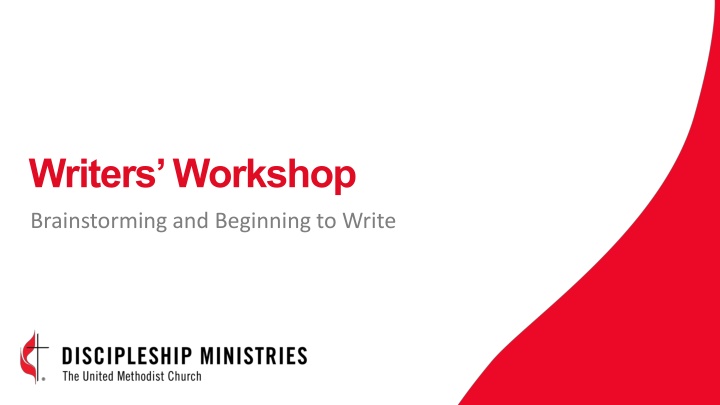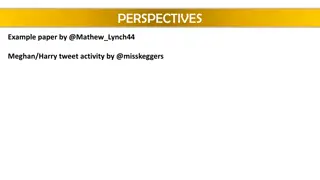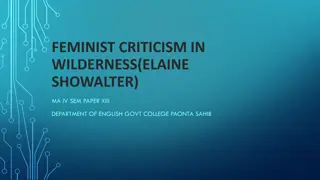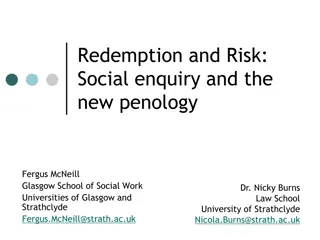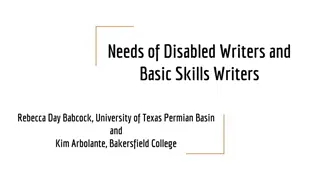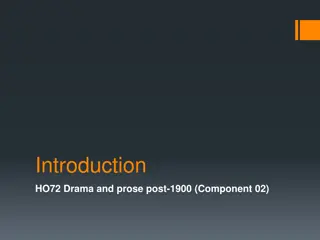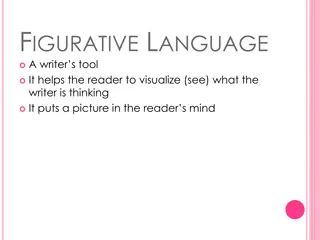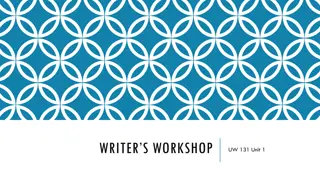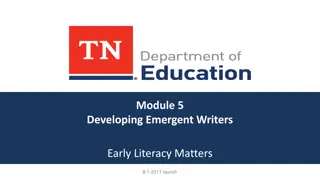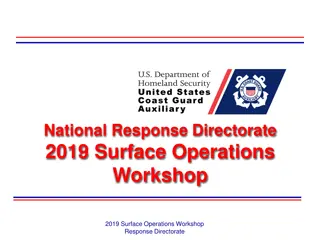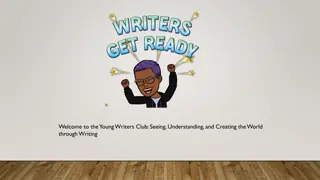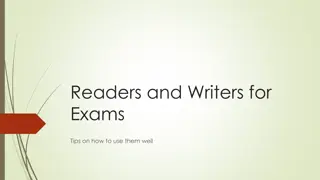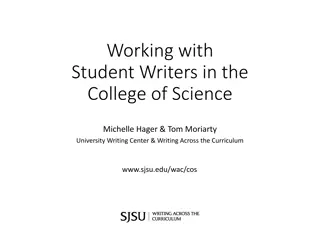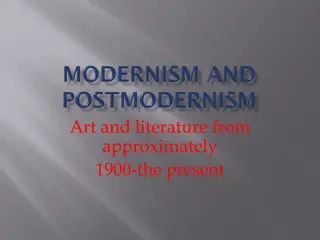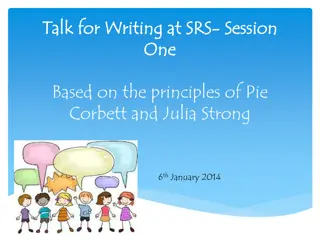Writers’ Workshop
Dive into the world of writing with this workshop on brainstorming and starting your writing journey. Unleash your creativity, discover new ideas, and begin crafting your own stories and articles. Whether you're a seasoned writer or a beginner, this workshop will provide valuable insights and practical tips to kickstart your writing process. Get ready to explore the art of writing and embark on a journey of self-expression through words.
Download Presentation

Please find below an Image/Link to download the presentation.
The content on the website is provided AS IS for your information and personal use only. It may not be sold, licensed, or shared on other websites without obtaining consent from the author.If you encounter any issues during the download, it is possible that the publisher has removed the file from their server.
You are allowed to download the files provided on this website for personal or commercial use, subject to the condition that they are used lawfully. All files are the property of their respective owners.
The content on the website is provided AS IS for your information and personal use only. It may not be sold, licensed, or shared on other websites without obtaining consent from the author.
E N D
Presentation Transcript
Writers Workshop Brainstorming and Beginning to Write
Establish a Vision for what you want to create and write Accept that God has called you to do this. Have the conviction that your mission (to write) is critical Be committed to it no lip-service and wishful desires Accept that God has called you to do this.
Necessary Conent A large notebook or Tablet A small tablet to carry around A box, file or drawer for your work A place you can write, undistrubed Scrap paper to wrote on where you can expieriment without inhibitions about wasting paper A pen or pencil A generous heart
Writing Environment Where can you find a place, indoors or outdoors, where you can write? A table? Make a calendar of your week and write down the times that you will devote to writing. Is it in the morning? Midday? Night time?
Start a Scrapbook of ideas Read through your local newspaper and clip out two stories, one that you find funny and one that you find intriguing. Put in your scrapbook. Look through some old magazines. Clip out three pictures of people whose faces look interesting (not people you know or know about. Put in your scrapbook. Next time you are out among people, watch and listen. When you get home, write one thing you heard someone say or saw someone do that piqued your curiosity. Put in your scrapbook.
In your scrapbook Just as a cook gathers up ingredients and utensils before she starts to cook, you are starting with some material (the things you put in your scrapbook) and tools (paper, pen). Before you can cook up your great work you need to generate some material, some ingredients for yourself. Notes, exercises, experimental sentences and first drafts need to be seen as the untreated material of the future work. (Using the cooking analogy) You cannot expect a first draft to be great writing any more than you would expect raw flour to be tasty. You have to work with your writing as the cook has to work with his ingredients. Your notebook/scrapbook is the refrigerator of your writing, a storehouse for future writing Do morning pages every day. If you are stuck and can t move forward, stop and do a freewrite or morning pages.
Keep a Journal of Observations Write in it regularly. Keep it concrete and specific. Take a single event of your day washing, dressing, your walk to work, the weather outside, the furnishing of your living room, a conversation you overheard, a child you saw playing. Don t make it abstract, intellectual, or general. Don t write about gardens in the springtime; write about this particular bulb spike you noticed breaking the ground. The more you write down what you saw and heard and felt and thought, then the more you will see and hear and feel and think.
Hints for Getting Started Plan your sessions in advance. (the night before plan what you will write tomorrow) Stop on time. Don t over do your writing time and burn yourself out. Keep a commentary on your writing time. At the end of each writing session, jot a few notes about the session: did I enjoy this exercise? Did I feel unexpected things coming up? Am I being honest? Was the writing satisfying? Difficult? Disappointing? Exciting? Read over your material once, without correcting. Let some time pass before you read it again to critique and make it better. Quieting the Inner Critic. Everyone has an inner critic. Tell it firmly that you do indeed value its critical impulse and know it will help you eventually indeed that it will be crucial to the production of anything worth reading but not yet.
Roles and Tools The Writer you are in creation mode, get your thoughts on paper, be confident of your words and your vision {symbol: the PEN} The Big-Picture Editor You are looking at the WHOLE of the piece. You read it all at one time and decide it the pieces flow together well, if the structure is right, if the order needs to be re-arranged or even cut away-- noticing {symbol: the HIGHLIGHTER noticing the pieces that need to be fixed} The Detail Editor You are looking at the piece paragraph by paragraph, line by line, word by word. You are a fixer. You fix whatever is wrong with the sentences and the words and the grammar. {symbol: A RED PENCIL}
Gather Materials Research Interviewing Readings Observing Many have undertaken to draw up an account of the things that have been fulfilled among us . . . Therefore, since I myself have carefully investigated everything from the beginning, it seemed good also to me to write an orderly account for you . . . Listening Analyzing Luke 1:1-3
Project exercise. Lead exercise on 1) description of project 2) brainstorm pieces 3) create outline of logical flow 4) who are possible writers (only you? Or others?) 5) what is the time frame 6) create a project schedule with DATES
Tips for Productive Writing Consistent, regular writing, rather than hit-and-run brings satisfying results. Free-writing sessions help to deliver us from mental block. Keep on writing even when you don t feel like it. Hardly any first draft is good enough, so avoid wasting time on self-editing when the ideas are still flowing. Don t discard anything you write it is the raw material for expansion.
STICK TO PROCESS Make time AND PLACE for writing. FINISH THE PROJECT A writer s first reward is to finish the manuscript. I press on toward the goal unto the prize of the high calling of God in Christ Jesus. Philippians 3:14
Exercise: FREE WRITE Write for 20 minutes without stopping. Write whatever comes to your mind. Do not worry about the content, style, etc. Just write. Or use Ezekiel 37 writing prompt.
THE INNER CRITIC Take some of the pressure off of yourself to do only good work . What are some of the voices, barriers that keep us from writing? Are there any voices from your past that haunt you, that keep you from writing? To get ride of the inner critic, WRITE A LOT! Write as a spiritual practice, the good, the bad and the ugly. Write 3 morning pages each day to break the inner critic.
